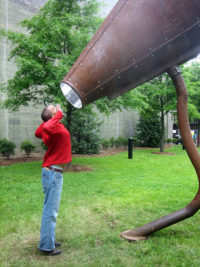
When I first started donating, I did so anonymously. My default baseline is to be humble and avoid showing off. I didn’t want others around me to think that I have a stuffed head and hold too high an opinion of myself. I also didn’t want them to judge my giving decisions, as some may have judged them negatively. I wish I knew back then that I could have done much more good by publicizing my donations and other goods deeds, such as by signing up first for The Life You Can Save pledge to donate at least 1% of my annual income to effective charities, and then the Giving What We Can pledge to donate 10% of my income.
Why did I change my mind about being public? Let me share a bit of my background to give you the appropriate context.
As long as I could remember myself, I was always interested about analyzing how and why individuals and groups evaluated their environment and made their decisions to reach their goals – rational thinking. This topic became the focus of my research as a tenure-track professor at Ohio State in the history of science, studying the intersection of psychology, cognitive neuroscience, behavioral economics, and other fields. While most of my colleagues focused on research, I was just as passionate about sharing my knowledge with others, focusing my efforts on high-quality, innovative teaching. I perceived my work as cognitive altruism, sharing my knowledge about rational thinking, and students expressed much appreciation for my focus on helping them make better decisions in their lives. Separately, I engaged in anonymous donations to causes such as poverty alleviation, helping children have better lives, etc.
Yet over time, I realized that by teaching only in the classroom, I would have a very limited impact, since my students were only a small minority of the population I could potentially reach. I began to consult the literature in my research field of psychology on a topic I did not study before in any depth, namely how to spread my knowledge broadly.
The breakthrough for me was reading Robert Cialdini’s works, especially his best-selling classic, Influence: The Psychology of Persuasion. Reading this book, and the many other books that followed and advanced this field of social influence, especially Dan and Chip Heath’s Made To Stick, really opened my eyes. I learned a great many strategies that I adopted to multiply the impact of my cognitive altruism work, as well as my charitable giving.
One of the most important lessons was the value of being public about my activities. Both Cialdini’s work and subsequent research showed that our peers deeply impact our thoughts, feelings, and behaviors. We tend to evaluate ourselves based on what our peers think of us, and try to model behaviors that will cause others to have positive opinions about us. This applies not only to in-person meetings, but also online communities. A related concept called social proof illustrates how we evaluate appropriate behavior based on how we see others behaving. However, research also shows that people who exhibit more beneficial behaviors tend to avoid expressing themselves to those with less beneficial behaviors, resulting in overall social harm.
Learning about the importance of being public led to a deep transformation in my civic engagement. While it was not easy to overcome my intuitively shy, humble, and self-effacing nature, I realized I had to do it if I wanted to optimize my positive impact on the world – both in cognitive altruism and in effective giving.
I shared this journey of learning and transformation with my wife, Agnes Vishnevkin, an MBA and non-profit professional. Together, we decided to co-found a nonprofit dedicated to spreading rational thinking and effective giving to a broad audience using research-based strategies for maximizing social impact, Intentional Insights. Uniting with others committed to this mission, we write articles, blogs, make videos, author books, program apps, and collaborate with other organizations to share these ideas widely. The organization has grown rapidly since its founding in 2014, has a wide social media following, and regularly places articles in prominent venues.
For example, I recently published an article in The Huffington Post promoting effective giving by sharing publicly my story of how I became an effective altruist. It used research-based social persuasion strategies, such as appealing to emotions, using narratives, visual imagery, etc. As you’ll see from this Facebook comment on my personal page, it helped convince someone to decide to donate to an effective charity. Furthermore, this comment is someone who is the leader of a large secular group in Houston, and he thus has an impact on a number of other people. Since people rarely make actual comments, and far from all are fans of my Facebook page, we can estimate that many more made similar decisions but chose not to comment about it. In fact, the article was shared widely on social media, so it made quite some impact – the StumbleUpon shares are over 1K, for example.
This is one of many such examples of being public about my activities, whether in promoting effective altruism, engaging in cognitive altruism, or dealing with mental illness stigma by sharing my personal story. While this personal transformation to being public took some efforts, I think the results speak for themselves in demonstrating its impact. I am glad that I proved capable of overcoming my internal emotional reluctance by relying on the research.
I also rely on research to make other decisions, such as my decision to take the Giving What We Can pledge. Taking this pledge may feel uncomfortable in the moment. After all, it restricts my future options, and prevents me from spending my money freely. Yet that’s exactly the point! The strategy of precommitment is key here – we make a decision in a state where we have the time to consider their consequences in the long term, and specifically wish to constrain the options of our future selves. That way, we can plan within a narrowed range of options and make the best possible use of the resources available to us. Thus, I can plan to live on 90% of my income over my lifetime, and plan to decrease some of my spending in the long term so that I can have that money to give to charities that I believe are most effective for making the kind of impact I want to see in the world.
Knowing about the importance of publicizing my good deeds and commitments, I recognize that I can do much more good by sharing with others about my decision to take the pledge. Through my ability to influence my peers and provide them with social proof, and through the platform provided by Intentional Insights, I can reach a broad audience and encourage them to take the pledge. Indeed, this article illustrates well my capacities in this sphere.
Yet those of you who took the pledge or just engage in good deeds, and do not have the kind of platform provided by Intentional Insights should not feel discouraged. All of you have friends, and the large majority of you have social media channels. You all have the power to be public about your good deeds through the click of a button, through mentioning your activities in casual conversations, or through wearing clothing that spreads positive messages.

According to the scholarly literature, by doing so you will be bringing about much good in the world. Even though it may not feel as tangible as direct donations, sharing with others about your good deeds and supporting others doing so may in the end do much more good than simply engaging in those activities quietly. Moreover, remember that research shows that those who engage in socially beneficial behaviors are disinclined to share about them publicly.
Since you read this article, and know about this research, you are now in a privileged position of having the knowledge about what will do the most good. So go out there and tell others, loudly and proudly, about your good deeds! Even though it may not feel as tangible as direct donations, sharing with others about our good deeds and supporting others doing so may in the end allow us to do even more good.




